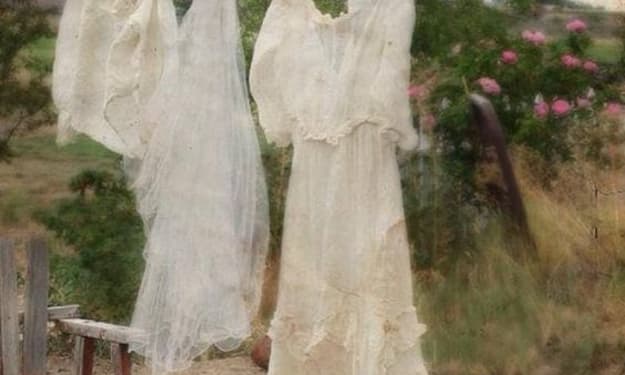Excerpt from: I'm So Sorry I'm Not Dead
The boy didn't yet have the shame we inherit.

A young boy stood, crumpled homework in hand, alone by the train tracks. He was deep into the forest, far from the road, and adjacent to the meadow beyond the Atcherkamp’s crop and head-row. The faded words on the homework sheet asked the young boy the assumed square acres of a property line, and inquired as to how much it would cost. The boy didn’t care. He just wanted to look at the old tracks, the discarded planks, and bits of stuff lying on the gravel, dotted sporadically with the wildflowers that poked through the gray rocks to have a look around before their predictable death. He liked the bits of stuff, examining, analyzing, and eventually categorizing the little things as a bottle cap, a piece of a lady’s blouse, a bit of orange flagging, or his favorite category, unknown. After knee-high frustration, he would be overcome with desire to bring the thing home for further inspection and research. And while he was instructed to “never bring street waste into this house again”, his waste was almost always from his spot on the tracks, and certainly never from the filthy street. This was a distinction he knew was better unvoiced.
But today, he had no appetite for the exploration of plastics and fluff the rough ground offered. He was somewhere else today, gazing at the trees, tall and willowy, as well as the ditch that they say was dug by slaves of Washington himself back in the 1700s. But to be fair, there is hardly a divet in a stump in Virginia that isn't somehow credited to Washington. And either way, all the ditch does now is dry the old meadow. And the same folks who make these claims say that the old meadow water still tastes like sweet tobacco that once grew there. Southern nostalgia didn’t have the death grip on this boy that it seemed to have on his little town, so these thoughts skipped across his brain like a smooth rock on clear water.
He would get like this sometimes: quiet, dreary. “You think too much,” James would always tell him. The young boy extensively pondered the concept each time he heard it, but never seemed to come to a conclusion.
His distant trance broke when his eyes approached a patch of mustard across the tracks, by the ditch, and a few sumac trees. Protruding from the mustard was something black. It almost looked like a-
As he began to peer forward, the bellowing whistle blew, and the boy jumped back. The train galloped on through, creating the familiar, but bitter-smelling wind. The faded boxcars had plenty of room for logos, art, and rust stains. He always wished the cars were glass. He could remember his late uncle Benji telling him hippies lived in there and, gripping the bottle slightly tighter, he’d say, “smoking grass and prayin’ to the devil.” The wasn’t presented as an altogether good thing, but it seemed interesting, and certainly worthy of a peek or two. And the boy wasn’t tall enough to climb into a train car, and so he sat wishing for some transparency from the metal walls.
-boot. The train passed. The black thing looked like a boot. The boy set his homework on the ground (allowing a light breeze to rid himself of the situation), and started across the train tracks. He was right. The thing was, in fact, a boot. Face up, heel to the ground, toe pointed to the puffy, pale sky. The material was leather-stitched and laced to the ankle. It wasn’t muddy, but it was very much scuffed. The sock was brown lace, and the leg was muscular and bare until it reached a corduroy skirt, faded blue up to a black shirt, ripped and exposing the tall girl’s breast. The boy started to feel that he should be embarrassed. The boy also felt fear, mostly from the red that was beginning to stain her blonde hair. He began to shy back and check his surroundings.
But the boy didn’t yet have the shame that we inherit, and the curiosity of the situation had a magnetic pull on his brain. He pushed through the fear and patch of mustard, and peered closer still.
About the Creator
Eve Luxembourg
Currently taking life far too seriously. I wish I read more than I wrote, yet here we are. I am incredibly cyclical and I like to write down my mind before it shifts.






Comments
There are no comments for this story
Be the first to respond and start the conversation.